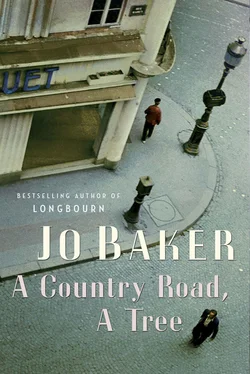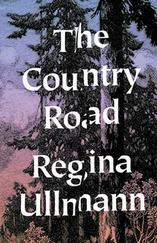“Better keep it down, my friend,” he says to Henri in French. “You never know.”
Henri wafts the concern away. “But I must practise my English, so that when the Americans come I can welcome them properly in their own language. It’s only right.”
He is not sure that Shakespeare’s English, via Connemara, is likely to make much sense to a GI. He drops his voice further still. “Would it not be wiser to learn German?”
“Oh, they’re last week’s news, the Germans. They’re done for.”
“Henri. Be careful.”
“It’s the paperwork, you see. Each new country they go blundering into, wagonloads of new paperwork, all those forms and dockets.” He grins. “They’ve bitten off more than they can chew in Russia, now, you mark my words. All that bureaucracy will bring the Nazis to their knees.”
“Maybe they like paperwork,” he says. “Maybe they relish it.”
“Buggers.” Henri’s face falls, but he speaks in perfect English idiom. “I bet they bloody do.”
—
In the circumstances, to find oneself still continuing on with all the business of life, to keep on putting one foot in front of the other, taking one breath after the other, while so many others have just stopped, is uncomfortable. It’s not as though he thinks he’s worth the effort.
He pushes into the post office, making the bell ring, inhaling the universal post-office smell of manila, ink and gum. He catches a glimpse of the postmistress in the back room, her startled face turned towards the sound of the bell. There’s a man there too; he’s tucking a sheaf of letters into an inner pocket. A brisk, muttered exchange. She bustles out with a smile and the fellow slides out past the counter and gives him a nod, passing with a cloud of country smell of sweat and wine and livestock. The bell dings and the fellow is gone.
He exchanges courtesies with the postmistress. She checks the pigeonholes. He leaves with a letter from his mother.
He reads as he walks, past the end of the schoolyard where the children run and shout, past two little girls, who, pausing in their game with marbles and chalk, stare huge-eyed and watch the spindly giant pass, and then snort with laughter when he’s gone. He folds the cheque into a pocket.
News of the dogs, and Lily the maid, and Cooldrinagh now sold, and the new place half built — she is even going to call it New Place, which makes him smile — and Frank and Janet, of card parties and coffee mornings and church. Mollie who had walked the strand with him at Greystones, hair blowing, catching in her mouth. Sheila now settled comfortably in Wales with the girls and sending postcards, everybody well. But worried about him.
He turns it over, reads on to her signing-off, then folds it up and stuffs it away. It is warm and it is kind and it is concerned. It seems that they can only be close when they are at such a distance, when the whole of Europe stands at war between them. He should not be putting her through this, all this, all this worry. She is old, she is not well; she is his mother. That queasy umbilical tug. Still, he pulls against it.
He goes past the front of the house. He continues on past Miss Beamish’s, through the woods, following the road that winds downhill, underneath the cypresses. He walks as the red road fades to pink, out on to the limestone territory, as the road becomes a white line tracing through the vineyards. The far hills are white with bare stone like a fall of snow. His boots scuff white mud on to themselves.
He takes off his coat, slings it over an arm. Keeps on walking.
He could have stayed in Ireland. To save her this. Getting old and alone and worrying about him.
He is halfway up the slope of the ancient bridge before he notices where he is. Beyond the balustrade there’s a twenty-foot drop and white water churns over rocks below. He peers down: it’s barely a stream; it must have shrunk considerably over time, to have once merited a bridge like this.
When she is dead, he thinks, will the tug then not be to home, but down into the grave?
His friend just stepped out into the empty air.
The water tumbles, churns, it wears pits into the white rock. Beneath his hard palms, the stone is crumbly as lump sugar.
It had seemed brisk and simple, that step out of the window. But every moment leading up to that moment must itself have been a decision made.
He pushes away from the balustrade. He takes the slow way down, striding along the bridge, climbing the stile and then scrambling down to the water’s edge. A wading bird picks its way across the mud, and dips her beak down into it, and sifts the silt for food.
In the looped shade cast by the arches, he eases off his boots and socks and dips his feet into the stream. It is ice; it is vivid and it makes him gasp. His feet are all bones, bunions and blisters and ragged yellow nails as the water tumbles round them, and the one toe with the missing joint, as ugly as sin, and as human. He feels sorry for his feet; he knows what they’ve been through.
And so one finds one goes on living. One makes slime and one drags oneself along through the world. Because life is an active decision now. An act of resistance. And there is a certain satisfaction in it. One lives, however hard the struggle, to spite the cunts who want one dead.
—
He walks the dry miles back to the house in silence, skirting Suzanne hunched between her beanpoles, climbing the stairs to his desk. He is already elsewhere. Later she clumps around below, indoors; later still he smells soup. He will go down in a moment. But his pen moves across the page, and two men are contained within barbed wire; they walk parallel, pacing, disconnected and close. Contact, human contact: they crave it, and they shrink from it.
His pen spirals and loops across the paper.
The sun sinks. Then there are voices. Speaking urgently and hushed.
When he comes downstairs, parched and sore-eyed, the room is dim, the lamp not yet lit. It takes him a moment to see Suzanne at the table there, with her friend Yvonne hunched on the other side, her back to him, and Yvonne’s brother, Roger, standing in the open back door, smoking a cigarette.
“It’s the professor,” Suzanne says.
Yvonne turns round to look at him. Her face is blotted, swollen with tears. The professor is Marcel. Her husband.
“What happened?”
One of those half-breath silences, when someone has to say something that no one wants to hear again. “He’s been arrested.”
He draws out a chair, sits down with them. He feels a rush of sympathy for Yvonne, for the children, for her husband who he’s never really liked.
“What can we do?”
Yvonne wipes her cheeks. “I don’t know that there’s anything we can do. He wasn’t wearing his star or carrying his papers. So.”
“How did they know?”
“He was denounced.”
Roger speaks quietly. “We’ll think of something, Yvonne, don’t worry.”
“I don’t see what there is to think of.”
“Who denounced him?” he asks.
Yvonne shrugs, fierce. “We supply fruit and flowers in Apt — I should have insisted that I go instead. But we got too used to being safe. We got to expect that things would just be all right. But someone must have guessed, or suspected, and then…” She shakes her head.
It is late when the little group breaks up; it is an unhappy dispersal. They have arrived at no satisfactory conclusion. The professor can’t be proven innocent, since he can’t be proven not-Jewish. The only plan is that Yvonne assert her remaining rights as a Frenchwoman and a non-Jew; she must kick up as much fuss as possible, as though over some pet dog that has been impounded as a stray. Her man is not to be deported. If he must be detained, it must be in France. If she writes letters, makes appeals, makes a nuisance of herself, then maybe she can slow the deportation process, bog it down in paperwork, until something else happens and things change again. The war can’t go on for ever: Isn’t this what everybody says? That is the professor’s best hope, though it is a strange one to find oneself clinging to. That a French camp, like Drancy, with its unglazed windows and bare concrete floors, be considered a good. That his fate is just to wait there, as the war flares and fades around him.
Читать дальше










